

Anime.
Old SciFi Magazines. The Hugo and Nebula Awards. The Long Lost 1929 Science Fiction Movie That Predicted the Second World War. The Victorian Hugos: 1894 Brings The First Great Female Mad Scientist In Literature. The Victorian Hugos: 1893 Was to Books What 1977 Was to Movies. True History. True Stories or True Fictions (Ancient Greek: Ἀληθῆ διηγήματα) is a parody of travel tales, by the Greek-speaking Syrian author Lucian of Samosata, the earliest known fiction about travelling to outer space, alien life-forms and interplanetary warfare.
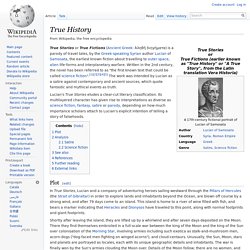
Written in the 2nd century, the novel has been referred to as "the first known text that could be called science fiction".[1][2][3][4][5] The work was intended by Lucian as a satire against contemporary and ancient sources, which quote fantastic and mythical events as truth. Lucian's True Stories eludes a clear-cut literary classification. Its multilayered character has given rise to interpretations as diverse as science fiction, fantasy, satire or parody, depending on how much importance scholars attach to Lucian's explicit intention of telling a story of falsehoods. Plot[edit] Brandon's Cult Movie Reviews: Top 10 Ray Harryhausen Films.
The Exact Moment When I Realized Final Fantasy VII Was A Masterpiece. Is The "Fix-Up" The Best Kind Of Science Fiction Novel There Is? A History Of Gundam, The Anime That Defined The Giant Robot Revolution How The Universe Is Saying Goodbye To Leonard Nimoy. The io9 Guide To Gundam. Leijiverse - TV Tropes. In praise of the sci-fi corridor. Hugo Gernsback. Hugo Gernsback (August 16, 1884 – August 19, 1967), born Hugo Gernsbacher, was a Luxembourgian American inventor, writer, editor, and magazine publisher, best known for publications including the first science fiction magazine.
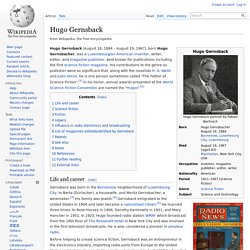
His contributions to the genre as publisher were so significant that, along with the novelists H. G. Wells and Jules Verne, he is one person sometimes called "The Father of Science Fiction".[1] In his honor, annual awards presented at the World Science Fiction Convention are named the "Hugos".[2] Life and career[edit] Before helping to create science fiction, Gernsback was an entrepreneur in the electronics industry, importing radio parts from Europe to the United States and helping to popularize amateur "wireless.
" The Tale of the Bamboo Cutter. Discovery of Princess Kaguya The Tale of the Bamboo Cutter (竹取物語, Taketori Monogatari?)
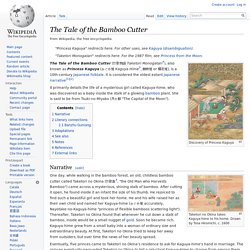
, also known as Princess Kaguya (かぐや姫, Kaguya Hime? , 赫映姫 or 輝夜姫), is a 10th-century Japanese folktale. Shsaplit - Rime of the Ancient Mariner and Frankenstein. Day after day, day after day, We stuck, nor breath nor motion; As idle as a painted ship Upon a painted ocean.
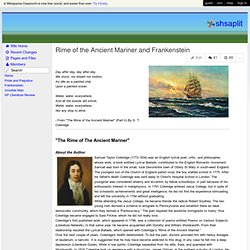
Water, water, everywhere, And all the boards did shrink; Water, water, everywhere, Nor any drop to drink. - From "The Rime of the Ancient Mariner" (Part II) By S. T. Coleridge. Sifting Through Arthur C. Clarke’s DVD Collection in Colombo. Yes, when this story gets to where it’s going, I end up in Arthur C.
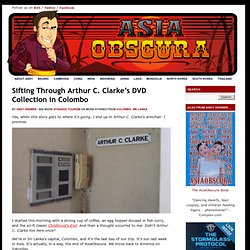
Clarke’s armchair. I promise. I started this morning with a strong cup of coffee, an egg hopper doused in fish curry, and the sci-fi classic Childhood’s End. And then a thought occurred to me: Didn’t Arthur C. Isaac Asimov's Foundation: The little idea that became science fiction's biggest series. Been looking forward to this post for a long time.

Where you been, Wimmer? Unfortunately I have to say that not only did you disappoint me with this post but by promising to give this treatment to a Foundation book every day for a whole week I know in advance that you have ruined my week because there is no frakking way you can out do this one! Seriously, this is one of the best posts I have ever read on this site and I've read darn near all of them. I know expect more out of this series than I did from Lucas around the turn of the millennium and we all know how that turned out. I could log about 5,000 words here but I'm going to limit myself to just a few. Otherwise, I just want to say what these books mean to me. Nineteen Eighty-Four. History and title[edit] A 1947 draft manuscript of the first page of Nineteen Eighty-Four, showing the editorial development.
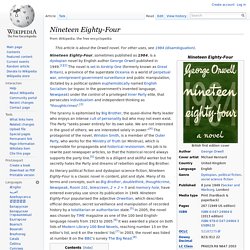
The Last Man in Europe was an early title for the novel but in a letter dated 22 October 1948 to his publisher Fredric Warburg, eight months before publication, Orwell wrote about hesitating between The Last Man in Europe and Nineteen Eighty-Four.[14] Warburg suggested changing the main title to a more commercial one.[15] Copyright status[edit] The novel will be in the public domain in the European Union and Russia in 2021 and in the United States in 2044.[21] It is already in the public domain in Canada;[22] South Africa,[23] Argentina[24] Australia,[25] and Oman.[26] Background[edit] The Left Hand of Darkness. The Left Hand of Darkness is a 1969 science fiction novel by Ursula K.
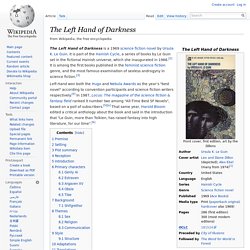
Le Guin. Who Goes There? Who Goes There?
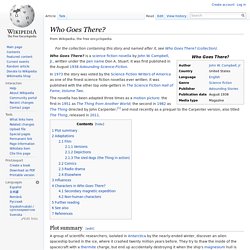
Is a science fiction novella by John W. Campbell, Jr., written under the pen name Don A. Stuart. It was first published in the August 1938 Astounding Science-Fiction. Metropolis (1927 film) Metropolis is a 1927 German expressionist epic science fiction drama film directed by Fritz Lang.
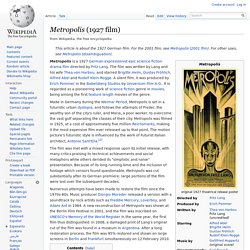
The film was written by Lang and his wife Thea von Harbou, and starred Brigitte Helm, Gustav Fröhlich, Alfred Abel and Rudolf Klein-Rogge. A silent film, it was produced by Erich Pommer in the Babelsberg Studios by Universum Film A.G.. It is regarded as a pioneering work of science fiction genre in movies, being among the first feature length movies of the genre. Made in Germany during the Weimar Period, Metropolis is set in a futuristic urban dystopia, and follows the attempts of Freder, the wealthy son of the city's ruler, and Maria, a poor worker, to overcome the vast gulf separating the classes of their city. Metropolis was filmed in 1925, at a cost of approximately five million Reichsmarks, making it the most expensive film ever released up to that point.
Youtube. The Empire Strikes Back – First Draft by Leigh Brackett. Download: Star Wars Sequel by Leigh Brackett The Empire Strikes Back came out in 1980 and even as a 10-year-old, I remember reading about an early version of the script written by a Sci-Fi author and screenwriter named Leigh Brackett. She turned in a first draft and passed away from Cancer in 1978. This draft was based on a story outline from George Lucas. From there, as the story goes, Lucas tried his hand at a draft or two but then turned those drafts over to Lawrence Kasdan who ultimately penned the script, although Brackett was still credited.
Walter Koenig explains how Star Wars saved Star Trek from dying. The Best Year in Science Fiction: 1982. @Moses Quetzalcoatl Bratrud: Generations is... okay. That's all I have to say on that matter. I also think TVH is overrated (far, far too preachy in retrospect), though I do agree it's one of the best ones. Everything You Never Knew About The Making Of Last Starfighter. Kinja is in read-only mode. We are working to restore service. God, I LOVE this movie to death. I watch it all the time still, it still works, just beautiful in story and playing with sci-fi clichés and such. The 25th anniversary edition Blu-Ray is a must-see, the docs are great, especially the one from '99 talking about the early days of CGI and then the updated 2009 one to note the movie's impact and legacy.
Watch A Quick Guide to Classic Who- Season 01. I went to see David Lynch's Dune in the theater in 1984. As we entered, we were given a glossary of Dune terms with our tickets. I understand this is not a common piece of movie ephemera, so I thought you might like to see it. : movies. Neuromancer. Background[edit] Neuromancer was commissioned by Terry Carr for the second series of Ace Science Fiction Specials, which was intended to exclusively feature debut novels. Given a year to complete the work,[5] Gibson undertook the actual writing out of "blind animal panic" at the obligation to write an entire novel – a feat which he felt he was "four or five years away from".[1] After viewing the first 20 minutes of landmark cyberpunk film Blade Runner (1982), which was released when Gibson had written a third of the novel, he "figured [Neuromancer] was sunk, done for.
Everyone would assume I’d copped my visual texture from this astonishingly fine-looking film. TOS: The City on the Edge of Forever. I Have No Mouth, and I Must Scream. It won a Hugo Award in 1968. Battlestar Galactica. Tears in rain monologue. Number Six (The Prisoner) Blake's 7. A limited range of Blake's 7 merchandise was issued. Books, magazines and annuals were published. The BBC released music and sound effects from the series, and several companies made Blake's 7 toys and models. Four video compilations were released between 1985 and 1990, and the entire series was released on videocassette starting in 1991 and re-released in 1997. It was subsequently released as four DVD boxed sets between 2003 and 2006. The BBC produced two audio dramas in 1998 and 1999 that feature some original cast members, and were broadcast on Radio 4. Overview[edit] Space: 1999. Space: 1999 is a British science-fiction television series that ran for two seasons and originally aired from 1975 to 1977.[1] In the opening episode, set on 13 September 1999, nuclear waste stored on the Moon's far side explodes, knocking the Moon out of orbit and sending it, as well as the 311 inhabitants of Moonbase Alpha, hurtling uncontrollably into space.
Kubla Khan and Dirk Gently’s Holistic Detective Agency. The Hitchhiker's Guide to the Galaxy. Blood Music (novel) Alien (film) Ender's Game. System Shock 2. Watch Here There Be Dragons - Star Wars: The Expanded Trashcan. Culture series. Cyber Pigs.html. David Brin. Charles Stross. Fahrenheit 451 - Thug Notes Summary and Analysis. Gravity's Rainbow. The Martian Chronicles. Stranger in a Strange Land. Brave New World. J. G. Ballard.